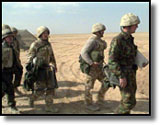
|
|
British troops: desert warfare in the Gulf
|
Iraq Accuses Britain of Killing Gulf War PoWs
The Iraqi Foreign Minister, Mohammed al-Sahaf, has asked the United Nations to request Britain to publish details of the alleged killing of Iraqi prisoners of war by British troops during the 1991 Gulf War.
In a letter to the UN Secretary-General, Kofi Annan, Mr al-Sahaf attached a report from the Sunday Times of 17 August to support his case.
The report claimed that the Ministry of Defence was investigating allegations that seven Iraqi PoWs had been shot by troops of the Royal Highland Fusiliers at the Maryland PoW camp, located near the Iraqi border at Hafir al-Batin in northern Saudi Arabia.
Mr al-Sahaf wrote: "The murder of Iraqi prisoners constitutes a heinous crime and a grave breach of international humanitarian law, particularly the 1949 Geneva Convention relating to the
treatment of Prisoners of War."
He asked Mr Annan to "intervene with the Government of the United Kingdom, in order to urge it to publish all the details of the crime and institute the necessary legal proceedings against the perpetrators".
This is not the first time that allegations have been made against the Royal Highland Fusiliers regarding Iraqi prisoners.
Last year, a former warrant officer, Jim Barrows, claimed that the regiment had tortured, starved and humiliated Iraqi prisoners. Mr Barrows was supported by the Labour MP, Tam Dalyell, who was told of the abuses during a visit to Iraq in 1991.
The Sunday Times quoted David Howell, a barrister who had served with the army legal service in the Gulf, as saying that he had been aware of the killing of "six or seven" Iraqi PoWs, though the circumstances were reported to be different.
"I think the PoWs were upset about some of the camp conditions, particularly food they were being given which was against their religious beliefs," Mr Howell said.
A Ministry of Defence spokesman told Politics '97 that the Ministry had been aware of the allegations for two years, but that no solid evidence had emerged. He added: "If any evidence does come to light, we would ask the Royal Military Police to investigate."

|

